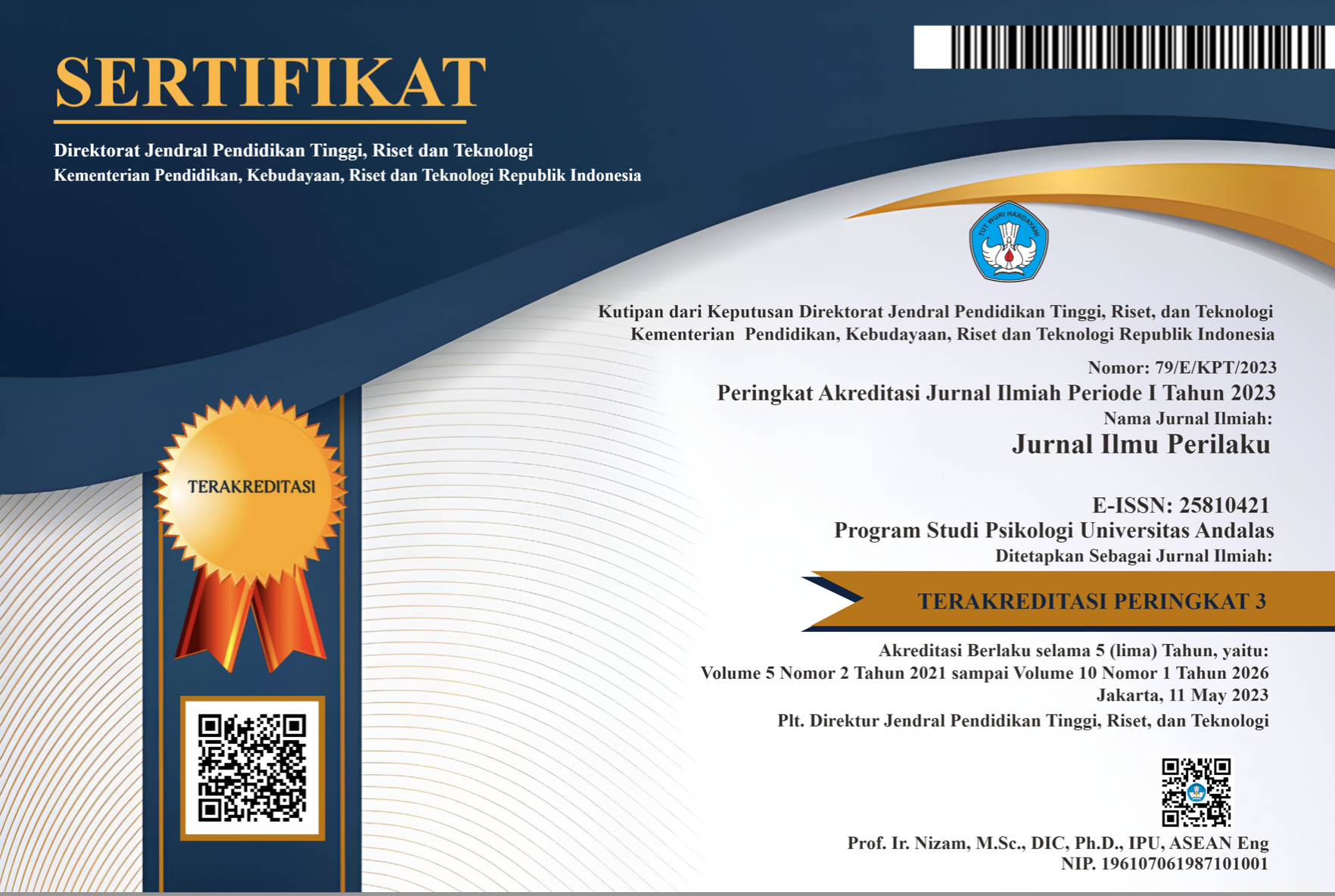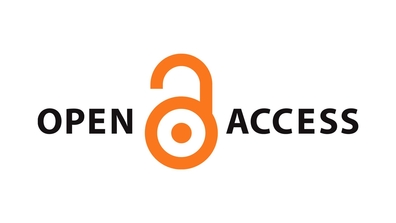Penerimaan Diri dan Subjective Well-Being pada Penyandang Difabel yang Berkarier
Abstract
Being a disabled person with a career is not easy in living a daily life in the world of work. In the work environment, people with disabilities often experience social inequality. The problems faced make it difficult for people with disabilities to achieve subjective well-being in a career due to poor self-acceptance factors. This study aims to determine the relationship between self-acceptance and subjective well-being in people with disabilities who have a career. The research method used was quantitative with a correlational design. 127 career-disabled people were used as participants in the study using a purposive sampling technique. Research data collection for self-acceptance variables using the Berger Self Acceptance Scale (BSAS) and subjective well-being variables using the Satisfaction with Life Scale (SWLS) and Positive Affect Negative Affect Scale (PANAS). The results of data analysis from the Pearson Correlation value of 0.053 and sig. = 0.283 (p > 0.05) showed that the research hypothesis was rejected, meaning there was no significant relationship with self-acceptance. This indicates that self-acceptance is not one of the factors associated with subjective well-being in people with disabilities who have a career.
Downloads
References
Akhtar, H. (2019). Evaluasi properti psikometris dan perbandingan model pengukuran konstruk subjective well-being. Jurnal Psikologi, 18(1), 29-40. https://doi.org/10.14710/jp.18.1.29-40
Anggraini, W., Kurniawan, F., Susilawati, S., & Hasna, A. (2020). Validitas dan reliabilitas instrumen teori pilihan karier Holland di Indonesia. Bulletin of Counseling and Psychotherapy, 2(2), 68–73. https://doi.org/10.51214/bocp.v2i2.34
Ansfridho, A. X., & Setyawan, D. (2019). Efektivitas pencapaian kinerja program pelatihan bagi penyandang disabilitas. Jurnal Ilmu Sosial dan Ilmu Politik (JISIP), 8(2), 55-63. https://doi.org/10.33366/jisip.v8i2.1717
Ardelt, M., & Edwards, C. A. (2016). Wisdom at the end of life: An analysis of mediating and moderating relations between wisdom and subjective well-being. Journals of Gerontology Series B: Psychological Sciences and Social Sciences, 71(3), 502-513. https://doi.org/10.1093/geronb/gbv051
BAPPENAS. (2021). Tinjauan peningkatan akses dan taraf hidup penyandang disabilitas Indonesia. Diakses dari https://perpustakaan.bappenas.go.id/e-library/file_upload/koleksi/dokumenbappenas/file/Staf%20Ahli%20Menteri%20Bidang%20Sosial%20dan%20Penanggulangan%20Kemiskinan/Kajian%20Disabilitas%20-%20Tinjauan%20Peningkatan%20Akses%20dan%20Taraf%20Hidup%20Penyandang%20Disabilitas%20Indonesia%20Aspek%20%20Sosioekonomi%20dan%20Yuridis.pdf
Bernard, M. E., Vernon, A., Terjesen, M., & Kurasaki, R. (2013). Self-acceptance in the education and counseling of young people. The Strength of Self-Acceptance: Theory, Practice and Research, 155-192. https://doi.org/10.1007/978-1-4614-6806-6_10
Catatan Tahunan (CATAHU) Komnas HAM Indonesia. (2017). https://www.indonesia.go.id/kategori/kabar-g20/4035/presidensi-g20-indonesia-angkat-isu-kesempatan-kerja-bagi-penyandang-disabilitas?lang=1
Cho, H., Yi-Tan, H., & Lee, E. (2020). Importance of perceived teammate support as a predictor of student-athletes’ positive emotions and subjective well-being. International Journal of Sports Science & Coaching, 15(3), 364-374. https://doi.org/10.1177/1747954120919720
De Nardo, T., Gabel, R. M., Tetnowski, J. A., & Swartz, E. R. (2016). Self-acceptance of stuttering: A preliminary study. Journal of Communication Disorders, 60, 27-38. https://doi.org/10.1016/j.jcomdis.2016.02.003
Denmark, K. L. (1973). Self-acceptance and leader effectiveness. Journal of Extension, 11(4), 6–12. https://eric.ed.gov/?id=EJ089139
Dewi, R. N. (2017). Penerimaan diri pada remaja penyandang Disabilitas. Journal Fakultas Psikologi Universitas Ahmad Dahlan, 2(3), 1-8. https://core.ac.uk/download/pdf/159923274.pdf
Diener, E. D., Emmons, R. A., Larsen, R. J., & & Griffin, S. (1985). Subjective well-being. Psychological Bulletin, 95(3), 542–575.
Diener, E., Kanazawa, S., Suh, E. M., & Oishi, S. (2015). Why people are in a generally good mood. Personality and Social Psychology Review, 19(3), 235–256. https://doi.org/10.1177/1088868314544467
Diener, E., Lucas, R. E., & Oishi, S. (2018). Advances and open questions in the science of subjective well-being. Collabra: Psychology, 4(1), 1–49. https://doi.org/10.1525/collabra.115
Erissa, D., & Widinarsih, D. (2022). Akses penyandang disabilitas terhadap pekerjaan: Kajian literatur. Jurnal Pembangunan Manusia, 3(1), 22. https://doi.org/10.7454/jpm.v3i1.1027
Green, S. E., & Vice, B. (2017). Disability and community life: Mediating effects of work, social inclusion, and economic disadvantage in the relationship between disability and subjective well-being. In Factors in Studying Employment for Persons with Disability: How the Picture Can Change (pp. 225-246). Emerald Publishing Limited. https://doi.org/10.1108/S1479-354720170000010010
Hidayah, L. N., & Nurhadi. (2022). Makna kesejahteraan subjektif bagi perempuan penyandang disabilitas pada masa pandemi COVID-19. Journal of Social Development Studies, 3(1), 56–69. https://doi.org/10.22146/jsds.4378
Itzick, M., Kagan, M., & Tal-Katz, P. (2018). Perceived social support as a moderator between perceived discrimination and subjective well-being among people with physical disabilities in Israel. Disability and Rehabilitation, 40(18), 2208-2216. https://doi.org/10.1080/09638288.2017.1331380
Kaur, G., & Tan, P. L. (2018). Acceptance of Disability: A perspective from people with disability. Asian Journal of Behavioural Studies, 3(1), 1-10. http://dx.doi.org/10.21834/ajbes.v3i10.75
Kementerian Koordinator Bidang Pembangunan Manusia dan Kebudayaan Republik Indonesia (2023). Pemerintah penuhi hak penyandang disabilitas di Indonesia. Diakses dari https://www.kemenkopmk.go.id/pemerintah-penuhi-hak-penyandang-disabilitas-di-indonesia#:~:text=Saat%20ini%2C%20jumlah%20penyandang%20disabilitas,disabilitas%20terbanyak%20pada%20usia%20lanjut
Khairat, M., & Adiyanti, M. G. (2016). Self-esteem dan prestasi akademik sebagai prediktor subjective well-being remaja awal. Jurnal Psikologi UGM, 1(3), 180–191. https://doi.org/10.22146/gamajop.8815
Kweon, O. H. (2019). The influence of disability acceptance for people of disability on the life satisfaction: Focusing on the mediating effect of self-efficacy. Journal of Convergence for Information Technology, 9(6), 97-103. https://doi.org/10.22156/CS4SMB.2019.9.6.097
Li, S., Zhang, X., Luo, C., Chen, M., Xie, X., Gong, F., ... & Sun, Y. (2021). The mediating role of self-acceptance in the relationship between loneliness and subjective well-being among the elderly in nursing home: A cross-sectional study. Medicine, 100(40), e27364. https://doi.or/10.097/MD.0000000000027364
Mardiyanti, R., & Purwaningtyas, F. D. (2021). Kecenderungan perilaku body shame ditinjau dari self acceptance pada remaja awal putri di SMP Y Surabaya. Psikodidaktika: Jurnal Ilmu Pendidikan, Psikologi, Bimbingan & Konseling, 6(1), 155-171. https://doi.org/10.32663/psikodidaktika.v6i1.1316
Mulyani K., Sahrul, M., & Ramdoni A. (2022). Ragam diskriminasi penyandang disabilitas fisik tunggal dalam dunia kerja. Journal of Social Work and Social Services, 3(1), 11-20. https://jurnal.umj.ac.id/index.php/khidmatsosial/article/view/14448
Naraha, C., Sholehah, N., Anggelo, C., Budisantoso, K. N., & Widanarti, M. (2022). Penerimaan diri dan kesejahteraan subjektif pada mahasiswa selama pandemi COVID-19. Generasi Berjiwa Sociopreneur, Sinergis, dan Produktif, 101–115.
Navarro, D., Montserrat, C., Malo, S., González, M., Casas, F., & Crous, G. (2017). Subjective well-being: What do adolescents say?. Child and Family Social Work, 22(1), 175–184. https://doi.org/10.1111/cfs.12215
Priadana, F. I., & Sukianti, D. S. (2019). Penerimaan diri dengan subjective well-being pada lansia di Panti Werdha. In Prosiding Seminar Nasional & Call Paper Psikologi Sosial 2019: Psikologi Sosial di Era Revolusi Industri 4.0: Peluang & Tantangan. http://fppsi.um.ac.id/wp-content/uploads/2019/07/Fahrizal-Idham.pdf
Purinami, G., Apsari, N. C., & Mulyana, N. (2019). Penyandang disabilitas dalam dunia kerja. Focus: Jurnal Pekerjaan Sosial, 1(3), 234-244. https://doi.org/10.24198/focus.v1i3.20499
Rahayu, F. S. (2019). Konseling rasional emotif perilaku untuk meningkatkan penerimaan diri pada remaja hamil diluar pernikahan. Prophetic: Professional, Empathy and Islamic Counseling Journal, 2(1), 143-152. https://doi.org/10.24235/prophetic.v2i1.4756
Rahmah, R. (2019). Penerimaan diri bagi penyandang disabilitas netra. Alhadharah: Jurnal Ilmu Dakwah, 18(2), 1-16. https://doi.org/10.18592/alhadharah.v18i2.3380
Rinmalae, M. P., Regaletha, T. A. L., & Benu, J. M. Y. (2019). Harga diri dan penerimaan diri remaja akhir di panti asuhan Sonaf Maneka Kelurahan Lasiana Kota Kupang. Journal of Health and Behavioral Science, 1(4), 199-206. https://doi.org/10.35508/jhbs.v1i4.2104
Riyanti, C., & Apsari, N. C. (2020). Gambaran aktualisasi diri penyandang disabiitas fisik yang bekerja. Focus: Jurnal Pekerjaan Sosial, 3(1), 40-52. https://doi.org/10.24198/focus.v3i1.28483
Smith, S. R. (2022). Well-being and finiteness: Agency, self-acceptance, and disability. In The Ontology of Well-Being in Social Policy and Welfare Practice (pp. 93-117). Cham: Springer International Publishing. https://doi.org/10.1007/978-3-031-18142-9_4
Spiegel, T., De Bel, V., & Steverink, N. (2016). Keeping up appearances: The role of identity concealment in the workplace among adults with degenerative eye conditions and its relationship with wellbeing and career outcomes. Disability and Rehabilitation, 38(7), 627-636. https://doi.org/10.3109/09638288.2015.1055378
Steven, C. D., & Sawitri, D. R. (2016). Bersyukur di tengah sedih dan senangku: (studi kualitatif subjective well-being pada mahasiswa tunanetra). Jurnal Empati, 5(3), 439-442. https://doi.org/10.14710/empati.2016.15368
Su, H., Wang, L., Li, Y., Yu, H., & Zhang, J. (2019). The mediating and moderating roles of self-acceptance and self-reported health in the relationship between self-worth and subjective well-being among elderly Chinese rural empty-nester: An observational study. Medicine (United States), 98(28), 1–7. https://doi.org/10.1097/MD.0000000000016149
Szentagotai, A., & David, D. (2013). Self-acceptance and happiness. The Strength of Self-Acceptance: Theory, Practice and Research, 121-137. https://doi.org/10.1007/978-1-4614-6806-6_8
Tan, W. (2021). Kondisi tenaga kerja penyandang disabilitas: Tantangan dalam mewujudkan sustainable development goals. Jurnal RechtIdee, 16(1), 18-36. https://doi.org/10.21107/ri.v16i1.8896
Tentama, F., Situmorang, N. Z., & Muthmainah. (2018). Subjective well-being among women with disabilities. International Journal of Public Health Science, 10(1), 136-145. https://doi.org/10.11591/ijphs.v10i1.20616
Uppal, S. (2006). Impact of the timing, type and severity of disability on the subjective well-being of individuals with disabilities. Social science & medicine, 63(2), 525-539. https://doi.org/10.1016/j.soccimed.2006.01.016
Van Campen, C., & Iedema, J. (2007). Are persons with physical disabilities who participate in society healthier and happier? Structural equation modelling of objective participation and subjective well-being. Quality of Life Research, 16(4), 635-645. https://doi.org/10.1007/s11136-006-9147-3
Van Campen, C., & Van Santvoort, M. (2013). Explaining low subjective well-being of persons with disabilities in Europe: The impact of disability, personal resources, participation and socio-economic status. Social Indicators Research, 111, 839-854. https://doi.org/10.1007/s11205-012-0036-6
Virlia, S., & Wijaya, A. (2015). Penerimaan diri pada penyandang tunadaksa. In Seminar Psikologi dan Kemanusiaan Pscyhology Forum UMM (pp. 372-377). https://mpsi.umm.ac.id/files/file/372-377%20Stefani%20Andri.pdf
Watson, D., Clark, L. A., & Tellegen, A. (1988). Development and validation of brief measures of positive and negative affect: the PANAS scales. Journal of Personality and Social Psychology, 54(6), 1063-1070. https://doi.org/10.1037/0022-3514.54.6.1063
Xu, W., Oei, T. P., Liu, X., Wang, X., & Ding, C. (2016). The moderating and mediating roles of self-acceptance and tolerance to others in the relationship between mindfulness and subjective well-being. Journal of Health Psychology, 21(7), 1446-1456. https://doi.org/10.1177/1359105314555170
Yulilla, D. (2017). Prinsip individual adler pada atlet tuna daksa. Psikoborneo: Jurnal Ilmiah Psikologi, 5(4), 590–597. http://x.doi.org/10.30872/psikoborneo.v5i4.4479
The non-commercial use of the article is governed by the Creative Commons Attribution license as currently displayed on Creative Commons Attribution-NonCommercial-ShareAlike 4.0 International License.
JIP's spirit is to disseminate articles published are as free as possible. Under the Creative Commons license, JIP permits users to copy, distribute, display, and perform the work for non-commercial purposes only. Users will also need to attribute authors and JIP on distributing works in the journal.
Please find the rights and licenses in Jurnal Ilmu Perilaku (JIP).
- License
The non-commercial use of the article will be governed by the Creative Commons Attribution license as currently displayed on Creative Commons Attribution-NonCommercial-ShareAlike 4.0 International License.
- Author’s Warranties
The author warrants that the article is original, written by stated author(s), has not been published before, contains no unlawful statements, does not infringe the rights of others, is subject to copyright that is vested exclusively in the author and free of any third party rights, and that any necessary written permissions to quote from other sources have been obtained by the author(s).
- User Rights
JIP's spirit is to disseminate articles published are as free as possible. Under the Creative Commons license, JIP permits users to copy, distribute, display, and perform the work for non-commercial purposes only. Users will also need to attribute authors and JIP on distributing works in the journal.
- Rights of Authors
Authors retain the following rights:
- Copyright, and other proprietary rights relating to the article, such as patent rights,
- The right to use the substance of the article in future own works, including lectures and books,
- The right to reproduce the article for own purposes, provided the copies are not offered for sale,
- The right to self-archive the article.
- Co-Authorship
If the article was jointly prepared by other authors, the signatory of this form warrants that he/she has been authorized by all co-authors to sign this agreement on their behalf, and agrees to inform his/her co-authors of the terms of this agreement.
- Termination
This agreement can be terminated by the author or JIP upon two months’ notice where the other party has materially breached this agreement and failed to remedy such breach within a month of being given the terminating party’s notice requesting such breach to be remedied. No breach or violation of this agreement will cause this agreement or any license granted in it to terminate automatically or affect the definition of JIP.
- Royalties
This agreement entitles the author to no royalties or other fees. To such extent as legally permissible, the author waives his or her right to collect royalties relative to the article in respect of any use of the article by JIP or its sublicensee.
- Miscellaneous
JIP will publish the article (or have it published) in the journal if the article’s editorial process is successfully completed and JIP or its sublicensee has become obligated to have the article published. JIP may conform the article to a style of punctuation, spelling, capitalization, referencing and usage that it deems appropriate. The author acknowledges that the article may be published so that it will be publicly accessible and such access will be free of charge for the readers.










